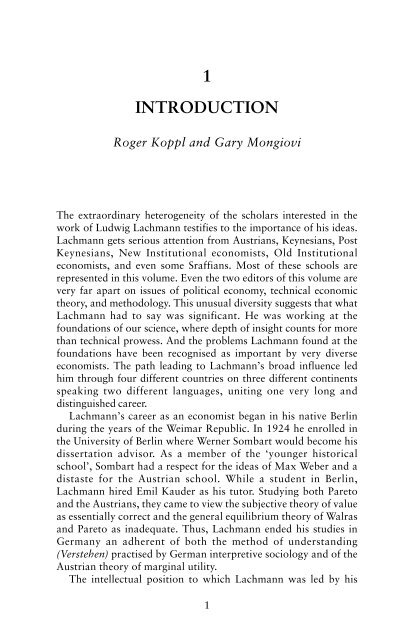Subjectivism and Economic Analysis: Essays in memory of Ludwig ...
Subjectivism and Economic Analysis: Essays in memory of Ludwig ...
Subjectivism and Economic Analysis: Essays in memory of Ludwig ...
You also want an ePaper? Increase the reach of your titles
YUMPU automatically turns print PDFs into web optimized ePapers that Google loves.
1INTRODUCTIONRoger Koppl <strong>and</strong> Gary MongioviThe extraord<strong>in</strong>ary heterogeneity <strong>of</strong> the scholars <strong>in</strong>terested <strong>in</strong> thework <strong>of</strong> <strong>Ludwig</strong> Lachmann testifies to the importance <strong>of</strong> his ideas.Lachmann gets serious attention from Austrians, Keynesians, PostKeynesians, New Institutional economists, Old Institutionaleconomists, <strong>and</strong> even some Sraffians. Most <strong>of</strong> these schools arerepresented <strong>in</strong> this volume. Even the two editors <strong>of</strong> this volume arevery far apart on issues <strong>of</strong> political economy, technical economictheory, <strong>and</strong> methodology. This unusual diversity suggests that whatLachmann had to say was significant. He was work<strong>in</strong>g at thefoundations <strong>of</strong> our science, where depth <strong>of</strong> <strong>in</strong>sight counts for morethan technical prowess. And the problems Lachmann found at thefoundations have been recognised as important by very diverseeconomists. The path lead<strong>in</strong>g to Lachmann’s broad <strong>in</strong>fluence ledhim through four different countries on three different cont<strong>in</strong>entsspeak<strong>in</strong>g two different languages, unit<strong>in</strong>g one very long <strong>and</strong>dist<strong>in</strong>guished career.Lachmann’s career as an economist began <strong>in</strong> his native Berl<strong>in</strong>dur<strong>in</strong>g the years <strong>of</strong> the Weimar Republic. In 1924 he enrolled <strong>in</strong>the University <strong>of</strong> Berl<strong>in</strong> where Werner Sombart would become hisdissertation advisor. As a member <strong>of</strong> the ‘younger historicalschool’, Sombart had a respect for the ideas <strong>of</strong> Max Weber <strong>and</strong> adistaste for the Austrian school. While a student <strong>in</strong> Berl<strong>in</strong>,Lachmann hired Emil Kauder as his tutor. Study<strong>in</strong>g both Pareto<strong>and</strong> the Austrians, they came to view the subjective theory <strong>of</strong> valueas essentially correct <strong>and</strong> the general equilibrium theory <strong>of</strong> Walras<strong>and</strong> Pareto as <strong>in</strong>adequate. Thus, Lachmann ended his studies <strong>in</strong>Germany an adherent <strong>of</strong> both the method <strong>of</strong> underst<strong>and</strong><strong>in</strong>g(Verstehen) practised by German <strong>in</strong>terpretive sociology <strong>and</strong> <strong>of</strong> theAustrian theory <strong>of</strong> marg<strong>in</strong>al utility.The <strong>in</strong>tellectual position to which Lachmann was led by his1

















